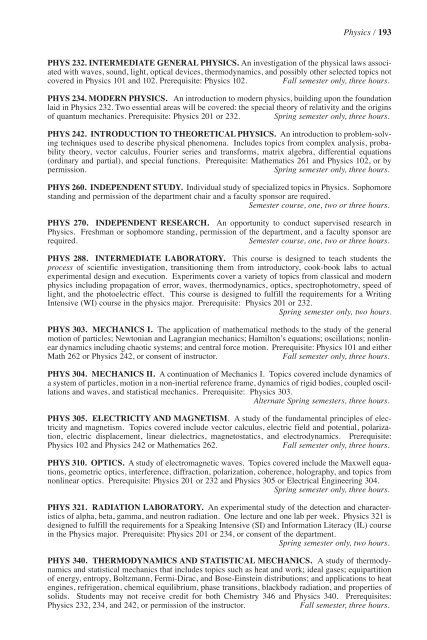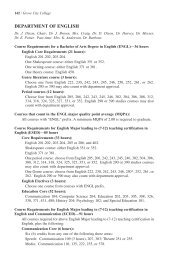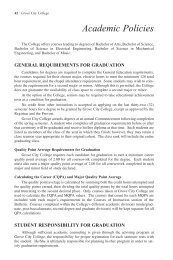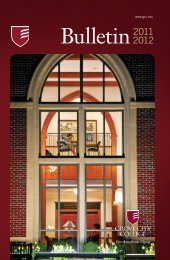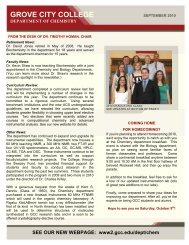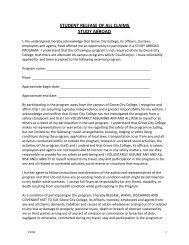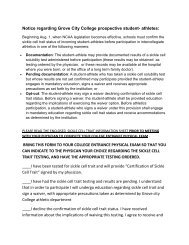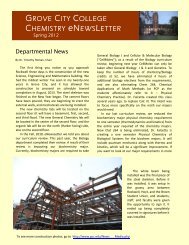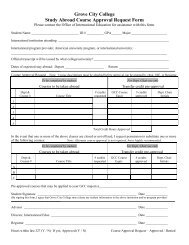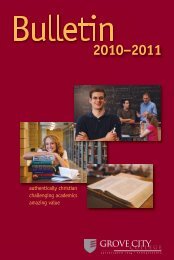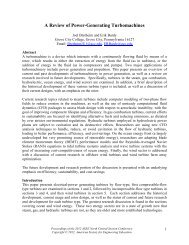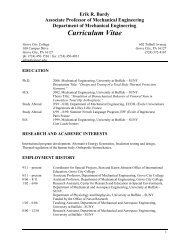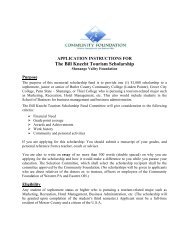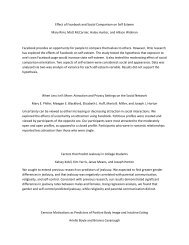2009–2010 - Grove City College
2009–2010 - Grove City College
2009–2010 - Grove City College
You also want an ePaper? Increase the reach of your titles
YUMPU automatically turns print PDFs into web optimized ePapers that Google loves.
Physics / 193<br />
PHYS 232. INTERMEDIATE GENERAL PHYSICS. An investigation of the physical laws associated<br />
with waves, sound, light, optical devices, thermodynamics, and possibly other selected topics not<br />
covered in Physics 101 and 102. Prerequisite: Physics 102. Fall semester only, three hours.<br />
PHYS 234. MODERN PHYSICS. An introduction to modern physics, building upon the foundation<br />
laid in Physics 232. Two essential areas will be covered: the special theory of relativity and the origins<br />
of quantum mechanics. Prerequisite: Physics 201 or 232. Spring semester only, three hours.<br />
PHYS 242. INTRODUCTION TO THEORETICAL PHYSICS. An introduction to problem-solving<br />
techniques used to describe physical phenomena. Includes topics from complex analysis, probability<br />
theory, vector calculus, Fourier series and transforms, matrix algebra, differential equations<br />
(ordinary and partial), and special functions. Prerequisite: Mathematics 261 and Physics 102, or by<br />
permission. Spring semester only, three hours.<br />
PHYS 260. INDEPENDENT STUDY. Individual study of specialized topics in Physics. Sophomore<br />
standing and permission of the department chair and a faculty sponsor are required.<br />
Semester course, one, two or three hours.<br />
PHYS 270. INDEPENDENT RESEARCH. An opportunity to conduct supervised research in<br />
Physics. Freshman or sophomore standing, permission of the department, and a faculty sponsor are<br />
required. Semester course, one, two or three hours.<br />
PHYS 288. INTERMEDIATE LABORATORY. This course is designed to teach students the<br />
process of scientific investigation, transitioning them from introductory, cook-book labs to actual<br />
experimental design and execution. Experiments cover a variety of topics from classical and modern<br />
physics including propagation of error, waves, thermodynamics, optics, spectrophotometry, speed of<br />
light, and the photoelectric effect. This course is designed to fulfill the requirements for a Writing<br />
Intensive (WI) course in the physics major. Prerequisite: Physics 201 or 232.<br />
Spring semester only, two hours.<br />
PHYS 303. MECHANICS I. The application of mathematical methods to the study of the general<br />
motion of particles; Newtonian and Lagrangian mechanics; Hamilton’s equations; oscillations; nonlinear<br />
dynamics including chaotic systems; and central force motion. Prerequisite: Physics 101 and either<br />
Math 262 or Physics 242, or consent of instructor. Fall semester only, three hours.<br />
PHYS 304. MECHANICS II. A continuation of Mechanics I. Topics covered include dynamics of<br />
a system of particles, motion in a non-inertial reference frame, dynamics of rigid bodies, coupled oscillations<br />
and waves, and statistical mechanics. Prerequisite: Physics 303.<br />
Alternate Spring semesters, three hours.<br />
PHYS 305. ELECTRICITY AND MAGNETISM. A study of the fundamental principles of electricity<br />
and magnetism. Topics covered include vector calculus, electric field and potential, polarization,<br />
electric displacement, linear dielectrics, magnetostatics, and electrodynamics. Prerequisite:<br />
Physics 102 and Physics 242 or Mathematics 262. Fall semester only, three hours.<br />
PHYS 310. OPTICS. A study of electromagnetic waves. Topics covered include the Maxwell equations,<br />
geometric optics, interference, diffraction, polarization, coherence, holography, and topics from<br />
nonlinear optics. Prerequisite: Physics 201 or 232 and Physics 305 or Electrical Engineering 304.<br />
Spring semester only, three hours.<br />
PHYS 321. RADIATION LABORATORY. An experimental study of the detection and characteristics<br />
of alpha, beta, gamma, and neutron radiation. One lecture and one lab per week. Physics 321 is<br />
designed to fulfill the requirements for a Speaking Intensive (SI) and Information Literacy (IL) course<br />
in the Physics major. Prerequisite: Physics 201 or 234, or consent of the department.<br />
Spring semester only, two hours.<br />
PHYS 340. THERMODYNAMICS AND STATISTICAL MECHANICS. A study of thermodynamics<br />
and statistical mechanics that includes topics such as heat and work; ideal gases; equipartition<br />
of energy, entropy, Boltzmann, Fermi-Dirac, and Bose-Einstein distributions; and applications to heat<br />
engines, refrigeration, chemical equilibrium, phase transitions, blackbody radiation, and properties of<br />
solids. Students may not receive credit for both Chemistry 346 and Physics 340. Prerequisites:<br />
Physics 232, 234, and 242, or permission of the instructor. Fall semester, three hours.


